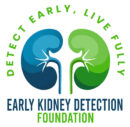Kidneys are vital organs that quietly sustain our lives every day. They filter our blood, maintain balance, and support overall health. Yet, kidney disease often creeps in unnoticed, becoming a silent threat to millions. Chronic Kidney Disease (CKD) has no early warnings, and many only realize its presence when significant damage is done. This harsh reality underscores the importance of vigilance and timely action.
By understanding the role of early detection, we can uncover hidden dangers, take proactive measures, and give our kidneys the care they deserve. So let’s explore the measures that are taken for this important aspect.
What is Chronic Kidney Disease (CKD)?
Chronic Kidney Disease means that your kidneys are no longer functioning, and through time, damage accumulates, leading to dire problems. Most of its symptoms tend to be almost unnoticed, at least not until the late stages, thus making the person unaware of an issue being present. CKD impairs the body’s ability to filter wastes and toxins. The condition leads to serious complications or causes kidney failure if left untreated. CKD is a growing global concern, and its impact must be curtailed urgently.
Why Early Detection is Important
Detecting kidney disease early helps manage it effectively. It gives doctors a chance to plan better treatment options. Early intervention can slow down the disease’s progress significantly. Screening programs detect CKD even before symptoms set in, allowing for healthier lifestyle choices. The earlier you know, the better you can take measures to protect your health. Early detection does not only helps improve health outcomes but also reduces the costs of health care for individuals and families.
Common Risk Factors for CKD
Some of the factors contributing to the risk of kidney diseases include diabetes and high blood pressure, which are the most common causes. A person having a family history of kidney problems is a big risk factor. Other risk factors include being obese, smoking, and being above 60 years of age. The best thing you can do with these risks is to attend frequent checkups, which will help you understand your risk factors. This means that monitoring is even more important for people with heart disease or those on certain medications.
Symptoms to Watch Out For
Symptoms of CKD often go unnoticed in its early stages. However, some warning signs can appear as the disease progresses. Fatigue, swollen ankles, or changes in urination patterns can occur. Persistent nausea, itchy skin, or muscle cramps are also common. If you notice these symptoms, consult your doctor immediately. Early action can save your kidneys from further damage and recognizing these signs early on can be life-saving and prevent long-term complications.
How is CKD Detected?
CKD detection relies on simple and painless medical tests. A blood test measures your kidney function by checking creatinine level and a urine test checks for protein, a sign of kidney damage and these tests are affordable and widely available. Regular checkups should include these basic tests; CKD is curable in its early stage, merely through lifestyle modification if it is detected earlier. Advanced diagnostic tools, like imaging tests, may also help doctors understand the extent of kidney damage.
Lifestyle Changes for Prevention
Healthy habits may decrease the probability of developing kidney disease. Healthy hydration and diet ensure healthy kidneys; reduce intake of salt and sugar, maintaining blood pressure within acceptable levels; a healthy life maintains good performance of your kidneys. Avoid smoking and limit alcohol to protect your kidneys. These simple steps can make a big difference in your kidney health. Managing stress and getting enough sleep also contributes to overall kidney wellness.
Treatment Options for CKD
Treatment varies depending on the stage of kidney disease. For early stages, lifestyle and drug treatments are usually enough, though doctors may prescribe medicines for controlling blood pressure and diabetes. Advanced stages require dialysis or a kidney transplant. Early detection helps avoid these severe outcomes. Managing the disease early improves quality of life and long-term health. Research into new treatments continues to offer hope for better management strategies.
Mainly the health of the kidneys is very essential for a healthy life. The early detection of kidney disease and treatment on time will prevent serious health issues. Regular screenings and healthy habits go a long way in prevention. Treatment is much more effective when CKD is caught in its early stages. Awareness will make others understand better about the health of the kidneys.
Let’s take care of ourselves and spread the word about early detection. We can fight kidney disease and ensure proper treatment for everyone. Kidney health is everyone’s responsibility, and by taking the right steps, we can make a difference for ourselves and our communities.
